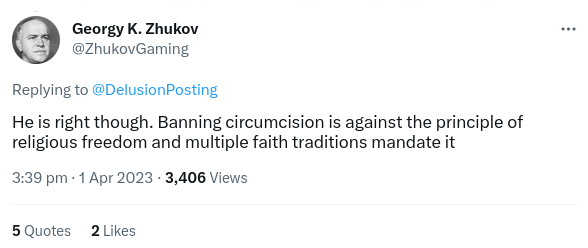Male genital mutilation
Male genital mutilation (MGM) involves the removal or alteration of male genitals as part of a religious or social custom, on a man or boy that does not, or cannot, consent to the procedure. When performed on an infant boy it is often called routine infant circumcision (RIC).
RIC remains legal in all nations today and remains widespread. Iceland considered banning RIC in 2018 before plans were cancelled.
MGM is widely practiced on boys past infancy and men in some African countries. Reports coming out of Africa suggest that many of the mutilations of men and boys occur in unhygienic conditions and without anaesthetic.
MRAs object to all forms of genital mutilation and most seek an outright ban with no religious exceptions. Some groups have argued that a ban with no religious exceptions is a violation of the right to freedom of religion. This is not so. Ultimately freedom of religion is a right held by an individual. Thus the individual must be protected from permanent bodily modification until they can reach the age of majority. Only as an adult should the individual be able to choose to make permanent modifications to their own body. The right of a parent to make medical decisions for their children should not apply as that right extends only to medically necessary procedures, with the sole possible exception of earlobe piercing which is superficial and fully reversible.
The rights of the individual must be paramount. Genital mutilation is a violation of a boy's rights over his own body.
Circumcision is very rarely actually needed.
There is strong evidence (elevated cortisol levels for an extended period, permanent changes in infant behaviour) that circumcision is traumatic for the infant.
Proponents of FGM use the same arguments as proponents of MGM. Contrary to what is often claimed the most common form of FGM is less severe than male circumcision. The argument that FGM is intrinsically worse than MGM runs counter to the evidence.[1][2]
Some proponents of RIC argue it is a violation of religious freedom whereas the opposite must be true since it presumes that the infant wishes to participate in a particular religious tradition.
See Also
- Bloodstained Men
- Brother K
- Female genital mutilation
- Intactivism
- Legality of routine infant circumcision
- Medically necessary circumcision
External Links
- Psychology Today
- Psychology Today
- http://www.cirp.org/library/pain/gunnar/
- https://www.ncbi.nlm.nih.gov/pubmed/7291435
- The adrenal cortisol response to surgery was not significantly reduced by the administration of lidocaine
- http://www.cirp.org/library/psych/
- https://www.sciencedirect.com/science/article/pii/0306453081900378
- https://www.ncbi.nlm.nih.gov/pubmed/3339788
- https://www.facebook.com/photo.php?fbid=10153487261661579&set=p.10153487261661579&type=1
- https://www.facebook.com/photo.php?fbid=976349085719943&set=p.976349085719943&type=1
- https://www.facebook.com/photo.php?fbid=976349475719904&set=p.976349475719904&type=1
- https://www.facebook.com/ChasesGuardians/posts/10203734791125353
- The incidence of post-circumcision complications at 2 years is shown to be 11.5%
- DrMomma
- http://iaim.net/extreme-trauma-from-male-circumcision-causes-damage-to-areas-of-brain
- https://academic.oup.com/ia/article-abstract/93/6/1339/4161587?redirectedFrom=fulltext
- http://nydailynews.com/life-style/health/circumcised-men-feel-sexual-pleasure-study-article-1.1264511
- https://www.doctorsopposingcircumcision.org/for-professionals/sexual-impact/
- Bodily autonomy is a men's issue, too | HBR Talk 188 by Badger Live Streams on YouTube
- Intactivist links on Hannah Wallen's Breaking the Glasses blog
- MGM at WikiGender
- Brian D Earp and Rebecca Steinfeld
